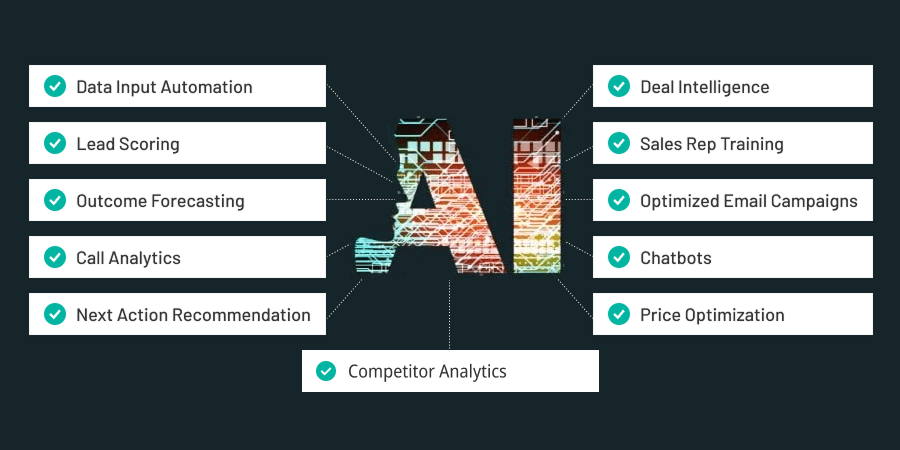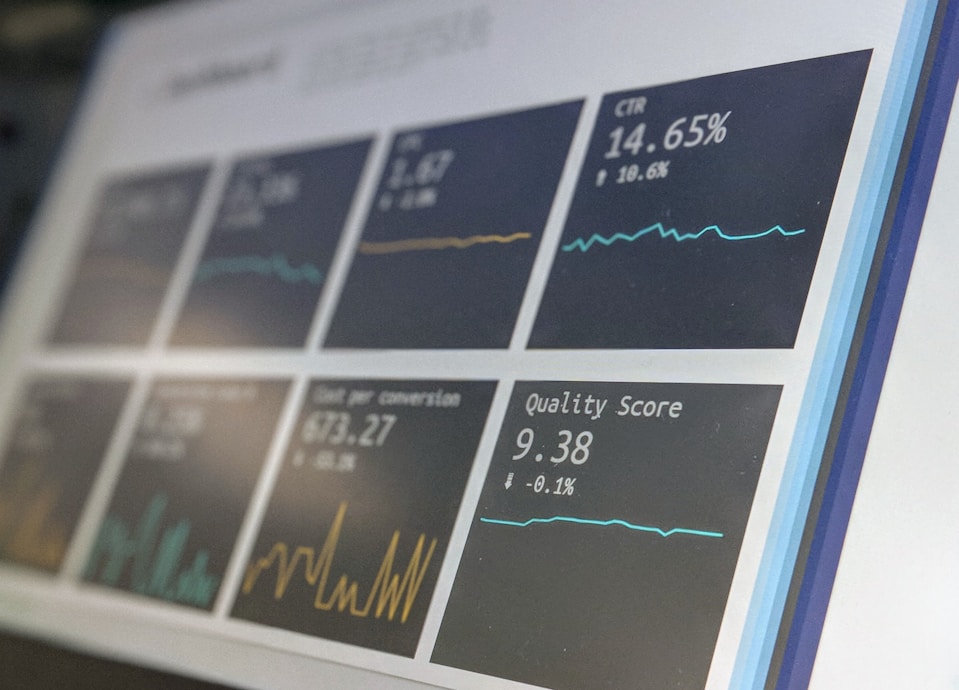According to Velvetech’s CEO, Yuri Yushkov, one of the key trends that has been influencing sales organizations is artificial intelligence, and it has become more imperative than ever to leverage it for efficient operations.
“Sales reps only spend around 30% of their time on sales activities; everything else is spent on other duties. So, the more meaningful automation we can attain to reduce the time they spend on data entry, research, and grooming existing records, the more time sales reps will have to nurture leads and have conversations with customers.”
— Yuri Yushkov
Yet, what does all this mean in practice?
Well, we are glad you asked because today, we’d like to dive into the subject of artificial intelligence in sales and discuss some of its most common use cases within this revenue-generating department.
Key Highlights
- Agentic AI can autonomously analyze vast datasets and prioritize leads more accurately, thus helping sales teams promptly generate quality leads.
- Conversational AI analyzes calls in real time and provides hints, helping agents to conclude the conversation in the best possible way.
- ML algorithms provide a solid overview of factors like market demand, competitor pricing, historical sales data, etc., enabling better pricing strategies that increase revenue and profitability.
- While employing AI in sales will definitely pay off in the future, the initial implementation may cost an arm and a leg.
Thus, if you’re interested in boosting the productivity of your sales team, keep on reading. No matter the industry you come from, insurance or finance, retail or healthcare, or whether you sell B2B or B2C, the uses we cover today will definitely be relevant for your business.
GenAI for Business
Watch our webinar to uncover how to integrate GenAI for improved productivity and decisions.
The Purpose of AI Development in Sales
Sales are challenging. After all, customers don’t just purchase your product or service as soon as they see it. Often, there are multiple touchpoints they have to go through prior to making a payment. Thus, with the sales department facing so many prospecting and lead generation activities, teams often get slammed with repetitive, manual work. Here, AI can come in to save the day.
Despite being still in its nascent stages, it is a technology that already presents a myriad of opportunities for the sales department. Consider this: the size of AI in marketing is projected to hit $82.23 billion by 2030. These impressive stats show that AI is going to remain one of the top technologies for marketers overall.
However, it’s important to note that AI is here not to replace sales representatives, but rather to augment their capabilities through automation. So, if you want to elevate your sales, now would be a great time to start thinking about AI software development for your firm. Otherwise, you risk falling behind and having to play catch-up with competitors who have long embraced this innovative technology.
Uncover more Sales Technology Trends That Shouldn’t Be Ignored
Types of AI Tools Used in Sales
Before exploring how to use AI in sales and get the maximum benefit from this technology, we need to look at what kinds of AI sales professionals can actually embrace in their daily activities. Although there can be other AI-based tools like predictive analytics, voice recognition, or even emotion AI, we’ll focus on the key six that, in our opinion, set the ground.
NLP

Natural language processing, most commonly used as NLP, is a branch of AI that enables the interaction between computers and humans. In essence, it allows machines to understand, interpret, and even generate human-like language. That’s why it’s called natural language processing.
AI-powered sales assistants and chatbots rely on NLP to comprehend and respond to conversations. Sentiment analysis is also about this technology to understand customer attitudes, preferences, and potential concerns. Another example here is email parsing, which sales reps use to extract meaningful information from emails.
On top of that, NLP, along with machine learning, lies at the forefront of conversational AI, which can be extremely useful, especially for sales over the phone. But let us not get into the nits and grits of these AI technology effectiveness right now. Stick around and we will address it soon. But before that, let’s have a look at other types of AI tools.
RPA and SPA

Turning to robotic process automation services is a great strategy for those who deal with lots of manual activities and want to eliminate their quantity. It involves the use of robots or software bots to automate rule-based tasks and help employees focus on more strategic and complex things.
Read more about the Benefits of the RPA Approach
In sales specifically, it’s called sales process automation that applies RPA to support sales-related tasks, such as data entry, lead scoring, or order processing. SPA contributes to enhanced speed and accuracy of sales processes by streamlining workflows and reducing errors.
AI Data Analytics

AI-based data analytics lies at the heart of many sales operations, being especially helpful for scrutinizing calls. We’ll talk about it further in detail. It generally supports teams in analyzing customer behavior, finding patterns, and making informed decisions. Particularly, predictive analytics can be used for lead scoring, sales forecasting, and optimizing pricing strategies.
On top of that, analytics and AI merged together provide a helping hand in training sales reps. Companies can rely on AI algorithms to scrutinize performance data and find what works and what doesn’t in the sales workflows, then train their employees based on the found insights. We’ll also discuss this use case a bit later.
AI analyzes vast amounts of data and provides accurate insight into crucial factors like market trends, customer demand, and competitors’ marketing efforts. Thus, leading to better sales forecasting. Moreover, in addition to processing historical variables, AI algorithms provide real-time insights that help identify changing demand promptly. Therefore, allowing businesses to forecast possible demand changes and adjust their sales strategies accordingly.
Computer Vision

When it comes to analyzing marketing materials, you probably do not solely deal with texts or calls. There are plenty of visuals to handle. It may take quite a long time for your team to process them all manually, while computer vision seamlessly sorts things out. It analyzes thousands of visual inputs in the blink of an eye and extracts meaningful information from them.
Generally speaking, AI-powered computer vision can assist your sales team in many ways. For instance, it can automate the scanning of product codes for warehouse staff and instantly supply the sales team with key details about the item, such as price and stock availability.
By leveraging this insight, your sales team can quickly identify products with a low turnover rate and increase sales through targeted promotions. Otherwise, these items may sit in your warehouse much longer. Additionally, this information can be quite useful for adjusting pricing.
Find out how to excel in accurate Demand Planning and Forecasting
Moreover, you can utilize this AI tool to optimize your store and level up sales. To get there, computer vision analyzes camera feeds and showcases how customers are interacting with certain products. It can also identify the areas of the store where clients tend to spend the most time.
These are just a couple of humble examples of what computer vision can bring to the table. But, surely enough to showcase how useful AI-powered computer vision can be for sales teams.
Agentic AI

Next up on our list is agentic AI. This type of artificial intelligence takes plenty of tasks off your team. For example, it can process customer data from CRM systems and emails, which can be resource-intensive and time-consuming if done manually.
Overall, agentic AI may autonomously integrate variables from different sources, centralize them, and analyze. So, all your team will require is just having a look at the insights agentic AI generates and making strategic decisions.
And you know what the best thing about agentic AI is? It can work independently and with high accuracy.
Discover more AI Types to Level Up Your Business
Generative AI

Finally, there are generative AI solutions that have recently entered the game. They refer to systems that can generate new content, such as text, images, or even entire pieces of creative work, based on patterns learned from existing data. Despite the young age of this technology, 65% of organizations already use GenAI for sales and marketing, according to McKinsey findings.
For example, generative AI can be applied in sales to create personalized and dynamic content for presentations, marketing materials, and emails. It enhances the ability to tailor communications to individual customers, improving engagement and relevance.
GenAI aims to provide the best possible response to client input. Typically, sales teams utilize generative AI in the creation of marketing materials. Predictive AI, on the other hand, helps accurately forecast future outcomes, thus elevating sales strategy.
So, when it comes to using AI to increase sales, you can consider both or simply go with one that better covers your current sales needs.
11 Game-Changing AI in Sales Uses
Now that you have a better understanding of what role AI can play in sales and what kinds of AI technology you can leverage, it’s time to get more specific. Let’s take a look at the various AI uses within the department so that you can best identify which ones can be of most benefit to your company.

1. Data Input Automation
One of the primary uses of AI in the sales process is for automating data entry. Typically, sales reps spend a lot of time on low-value activities like admin work and entering meeting or email notes into the CRM platform. Well, with AI, that no longer has to be the case.
AI can automatically track communications, appointments, and other sales initiatives to then sync all the relevant data from various sources into the CRM for effective relationship management. Thus, relieving sales agents from tedious, manual work and letting them focus on high-value tasks.
Uncover CRM Best Practices for Boosting Sales
2. Lead Scoring
Another major AI in sales use concerns lead scoring. As any sales rep knows, it can be difficult to identify which lead is worth your time and should be prioritized over others. Typically, it’s only determined based on each agent’s gut instinct, which comes from years of experience.
However, as we’ve mentioned earlier, with the integration of agentic AI, sales teams can leverage autonomous systems that analyze vast datasets promptly. This helps prioritize leads more accurately, reducing reliance on intuition alone.
From this perspective, AI tools are a real tasty morsel for B2B sales teams, as they deal with longer sales cycles compared with B2C. Meaning they require more resources and time to generate relevant leads.
Besides agentic AI, machine learning solutions and predictive analytics play their part in elevating lead generation. Specifically, they process historical data and social media activity to rank high-value leads that are likely to make a purchase.
Moreover, AI lead scoring systems can shortlist clients with a high possibility of reacting to cross-selling and upselling. Just picture how it can elevate your overall sales.
Thus, if you’ve got good lead generation processes in place but your team struggles to determine who to focus on first, it might be time to consider turning to AI. It will quickly simplify your agents’ work processes and systematize everything that’s got to do with lead scoring.
Discover how to Improve Lead Generation for Your Business
Artificial intelligence has redefined the way B2B handles sales. Firstly, AI helps automate time-consuming tasks like follow-up emails, data updates, synchronization, etc. Secondly, AI-powered technologies smoothly and promptly analyze huge datasets, thus elevating sales strategy. Eventually, AI in B2B sales improves lead qualification, allowing marketers to target the right audience and elevate bottom lines.
3. Outcome Forecasting
Besides predicting which leads are most likely to result in a sale, artificial intelligence can also forecast pretty much any outcome your agents may be interested in.
Which deals are likely to be closed by the end of this year? Which new customers may be interested in complementary products and services? All these questions and more can be answered with AI that goes through various data sources, analyzes customer behavior, and draws out insights that a human may not have been able to.
4. Call Analytics
Sales reps make a really vast number of calls daily. However, it’s important to remember that not all of those conversations pan out in the best way. In fact, most probably don’t.
So, what if your sales team were able to use real-time call analytics and conversation intelligence to ensure every call is top-notch? Chances are high that more calls would conclude successfully. Remember, we promised to zoom in on conversational AI in more detail and showcase how useful it can be for your sales team. And here we are.
Find out how Velvetech implemented AI Call Analytics to Boost Insurance Firm Sales
You see, things like speech-to-text transcription and dialogue visualization can power truly helpful dynamic scripts. Thus, enabling contact center agents to resolve complicated issues faster and close more deals. Primarily by automatically adjusting what should be said depending on the flow of the conversation or providing real-time suggestions to guide the dialogue.
AI-Based Contact Center Right in Your CRM
Full-featured Inbound & Outbound call center with AI-based agent scoring and call analytics.
5. Next Action Recommendation
Determining which action to take next is one of the most frequent dilemmas a sales agent has to face. Is it time to send an email after you’ve just met a prospect? What should that email ideally say? Is a call appropriate after your emails have gone unanswered? Or, is it best to reach out via LinkedIn? All these questions can plague the minds of sales reps daily.
It is essential to take an action that actually benefits the relationship and helps establish good communication. Otherwise, you may risk alienating the right connection by coming off as too pushy, or on the contrary, taking too long to get in touch that prospects are no longer interested in what you offer.
So, with the help of artificial intelligence and data science solutions, your sales and marketing specialists can get concrete recommendations on the optimal next steps they should be taking when building a relationship with each prospect or lead. By learning from historical data and the information provided about the potential customer, AI algorithms can essentially tell sales teams which action is most sensible.
As a result, your agents benefit from guidance and make truly data-driven decisions. Thus, freeing up their time to focus on relationship building and deal closing, not deliberating what to do next.
Gaining Control of Customer Engagements
What if every customer could deal with your single most effective sales or service person?
6. Deal Intelligence
Sometimes, it can be difficult to take a step back and analyze what all the closed, most profitable deals have in common. It would take too much time, and even then some intricate insights might escape the human mind.
AI, on the other hand, can extract meaningful information from myriads of data and deliver key findings to your dashboards in minutes. For instance, algorithms can identify factors that drive more deals, sales agents that close most valuable clients, and other findings you may deem relevant. Thus, helping better understand what goes into successful transactions so that you can keep doing it and improving existing processes.
7. Optimized Email Campaigns
Managing email campaigns is not an easy undertaking, as it includes crafting the entire strategy while aiming to achieve marketing goals. Fundamentally, it encompasses planning, execution, and analysis, where AI technology serves as a valuable assistant.
As you can already guess, algorithms analyze vast datasets promptly. This helps personalize content recommendations, suggest optimal send times, and come up with subject line options. AI here is like a fortune teller, predicting which email content is likely to resonate with your target audience. It, of course, increases the likelihood of engagement and conversion.
Additionally, AI has the ability to adapt to changing customer preferences through continuous learning, which ensures that your email campaign remains effective over time. With it, you can expect improved open rates, click-through rates, and overall campaign success.
8. Chatbots
We couldn’t omit chatbots from our list of AI use cases in sales and marketing. Most of us are well familiar with these tools as both customers and professionals. Chatbots leverage NLP, which we talked about before, to understand and respond to user queries, providing assistance and guiding users through various processes.
Today, you can choose from a wide variety of tools on the market and customize them to match perfectly your needs. Whether you decide to deploy a chatbot on a website, social media platform, or messaging app, it will help you offer instant support, answer frequently asked questions, and even qualify leads.
By automating routine interactions in sales, chatbots free up agents to focus on more complex tasks. In addition, they contribute to lead generation by capturing relevant information and initiating the sales process.
9. Price Optimization
The ones who offer competitive prices can naturally win more customers. Thus, many companies are embracing price optimization tools to streamline the process. These tools can drive an increase in sales due to the use of artificial intelligence that analyzes a range of factors to determine the most effective pricing strategy. These factors include market demand, competitor pricing, historical sales data, customer behavior, and more.
Machine learning algorithms continuously assess the mentioned variables and adjust prices dynamically to maximize revenue and profitability. So, with this approach, you can set optimal prices for products or services in real time, accounting for market fluctuations and consumer trends.
10. Competitor Analytics
While you’re leveraging AI to streamline your sales, your competitors are also keeping the ball rolling. And the big question is: who’s going to pull in the crowd? Sure thing, you want to be that one.
So, competitive analytics becomes your go-to. As you can guess, you need to process huge datasets, analyze your competitors’ marketing campaigns, pricing, ads, testimonials, etc. And who, if not AI, can smoothly and efficiently handle all the activities mentioned above?
11. Sales Rep Training
The last AI in sales use case we’ll cover today is all about staff training. First off, all of the data that this technology can analyze is imperative for quickly onboarding sales reps. After all, it provides all the key insights that they’ll need to be aware of.
Additionally, AI can identify what are the weak areas of each recent recruit after a few weeks of work and create a personalized training plan that ensures they quickly acquire the missing skills. Thus, making sales rep training much more individualized.
Lastly, if you choose to incorporate AI into a mobile application that your agents can use for training, they’ll always have the best guidance for managing client relationships, even on the go.
Benefits and Challenges of AI in Sales
So far, we’ve highlighted plenty of benefits that AI opens up for sales. But let’s be realistic, implementing this technology can entail some pitfalls. We’re dropping here a chart of key pros and cons of artificial intelligence in sales, so you have it in your hand before tapping into employment.
Pros of AI in Sales |
Cons of AI in Sales |
|---|---|
| Analyze huge datasets in seconds | Algorithmic bias can lead to ethical concerns |
| Automate plenty of sales tasks, thus improving insight accuracy and allowing humans to focus on strategic work | AI tools provide insights based on their training data; any inaccuracies here can lead to incorrect outputs |
| Provide real-time agent support to increase revenue | Giving AI algorithms authority to make decisions can reduce transparency, as it’s typically hard to understand how they make these decisions |
| Enhance customer experience with 24/7 support | When dealing with large amounts of sensitive customer data, it’s crucial to keep it secure and follow compliance regulations, which is not straightforward |
| Generate highly personalized marketing materials | AI relies on customer data and web content to generate text, so marketing materials may resonate with the audience but lack creativity |
| Elevate predictive analytics and help businesses gain a competitive edge | While the payoff can be significant, initial AI implementation may cost an arm and a leg |
AI in Sales vs. AI in Marketing
Marketing and sales are best friends, working in union to drive customer acquisition, engagement, and revenue growth. The synergy between them is powered by shared data, aligned goals, and the strategic deployment of technology. That includes AI, of course, to optimize customer interactions and drive business outcomes. However, there’s a subtle difference in AI tools for sales and marketing. Let’s have a quick look at it.
AI in the Sales Process
- Lead scoring and qualification: Here, AI focuses on evaluating and prioritizing leads for the sales team, streamlining the sales process.
- Chatbots and virtual assistants: The technology is primarily used to automate and enhance customer interactions, qualify leads, and provide immediate support.
- Sales forecasting: As we’ve mentioned, intelligence is used for predicting and optimizing sales outcomes, aiding in strategic planning and resource allocation.
AI in the Marketing Process
- Personalized content and recommendations: Marketing professionals often use AI to create personalized and targeted content and attract and nurture leads through various marketing channels.
- Predictive analytics: This one is about analyzing historical data to predict future trends and make strategic decisions in the marketing domain.
- Customer segmentation: Highly important for successful marketing initiatives, customer segmentation fueled by AI aims to categorize and reach specific customer segments with tailored messaging and promotions.
Embracing AI for Sales
Sales are all about building lasting relationships. However, that takes time, energy, and some savvy know-how. Now, it can all be enhanced with the help of intelligent technologies like AI that serve to automate repetitive processes, extract valuable insights, and forecast various outcomes.
At Velvetech, we understand that it can seem overwhelming to dive into AI by yourself and figure out how to use the technology for business growth. That is why we are pleased to offer easy-to-use, AI-powered contact center and call analytics solutions that can quickly help take your sales game to the next level.
Additionally, if you’re looking to gain a customized tool that fits well into your business, we provide extensive AI software development services to help organizations make the most of these innovative technologies and build solutions that truly cater to the unique requirements of each company. So, don’t hesitate to reach out to our team. We’ll be happy to discuss any project you may have in mind.

































